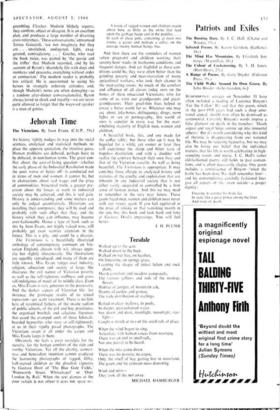Jehovah Time
The Victorians. By Joan Evans. (C.U.P., 55s.) As history rightly nudges its way into the social sciences, analytical and statistical methods re- place the apposite quotation, the intuitive guess. Human problems are debated, perhaps have to be debated, in non-human terms. The great con- flict about the cost-of-living question—whether the early phase of the Industrial Revolution made the poor worse or better off—is conducted not in terms of men and women; it cannot be, but in abstractions about real wages and the price of commodities. Structural truth, a greater pre- cision about the forces at work in industrial society may be achieved, and this is real gain. History is understanding and some matters can only be judged quantitatively. Historians are installing their computers; they will be used and probably with such effect that they, and the history which they can influence, may become over-fashionable. Hence a type of book such as this by Joan Evans, not highly valued now, will probably get even scantier attention in the future. This is a pity, and could be a disaster.
The Victorians is a beautifully illustrated anthology of contemporary comment on Vic- torian England, chosen with wit, always appo- site but slightly idiosyncratic. The illustrations are superbly reproduced, and many of them are little known. Miss Evans ranges over industry, religion, education and society at large. She illustrates the evil nature of Victorian poverty as well as the self-righteous stuffiness and gross self-indulgence of much of its middle class. Even so, Miss Evans is very generous to the possessors. And the darker aspects of Victorian life--for instance, the grotesque results of its sexual repression—get scant treatment. There is no hint here of tyrannical fathers, of the insane sadism of public schools, of the girl and boy prostitutes, the organised brothels and salacious literature that eased the cramped souls of those Jehovah- bearded hypocrites who stare so self-righteously at us in their rigidly posed photographs. The Victorians swept it all under the carpet and Miss Evans keeps it there.
Obviously she feels a ereat nostalgia for the security, for the benign comfort of the rich and worthy Victorians. Yet all the charity, earnest- ness and benevolent intention cannot eradicate the harrowing photographs of ragged, filthy, half-starved children or the ghoulish vignettes by Gustave Dore of The Blue Gate Fields,' 'Wentworth Street, Whitechapel' or 'Over London by Rail.' When the text glances at the Poor (which is not often) it does not spare us: A horde of ragged women and children swarm about here, as filthy as the swine that feed upon the garbage heaps and in the puddles. . . . In each of these pens, containing at most two rooms, a garret and perhaps a cellar, on the average twenty human beings live.
And then there are the reminders of women (often pregnant) and children working their seventy-hour weeks in loathsome conditions and frequent danger. And yet frightful as those con- ditions could be, they were often better than the grinding poverty and near-starvation of many agricultural workers, who took their chance in the man-eating towns. So much of the comfort and affluence of all classes today rests on the bones of these emaciated Victorians; who for some of us were our grandparents and great- grandparents. Their gruel-thin lives helped to create a better world for us. Whatever one may say about juke-boxes, delinquency, drugs, neon lights or sex or pornography, this world of ours is superior in every way for the over- whelming majority of English men, women and children.
A beautiful book, this, and one made for the coffee table: but those who sip it may be -beguiled for a while, yet sooner or later they will experience the sharp and bitter taste of hopeless destitution, and with a shudder will realise the contrast between their own lives and that of the Victorian canaille. As well as being beautiful, The Victorians is appropriate. It may convince those allergic to analytical history and statistics of the cruelty and exploitation that are inherent in any industrial society that is not either vastly successful or controlled by a firm sense of human justice. And this we may need to remember in the very near future. Those gaunt-faced men, women and children must never stalk our streets again. If you feel aggrieved at the price of whisky or that vanishing month in the sun, buy this book and look hard and long at Gustave Dores engravings. You w ill feel better.
J. H. PLUMB





























 Previous page
Previous page